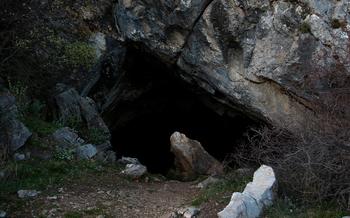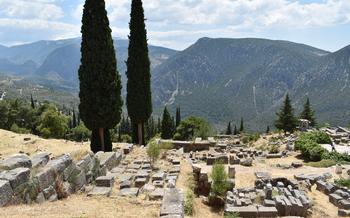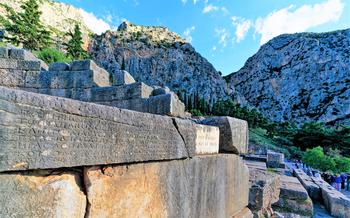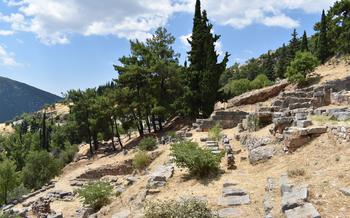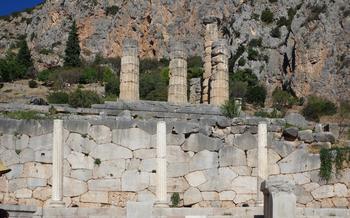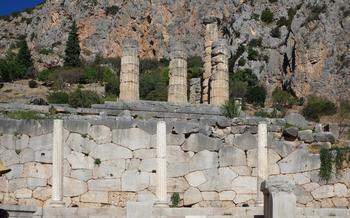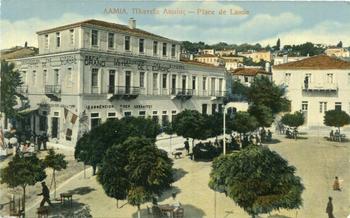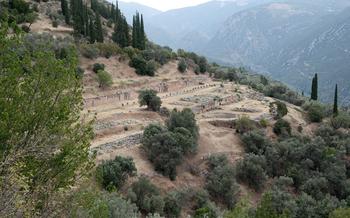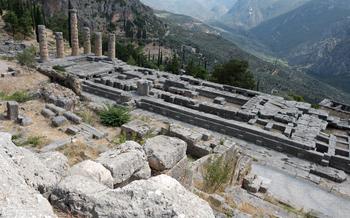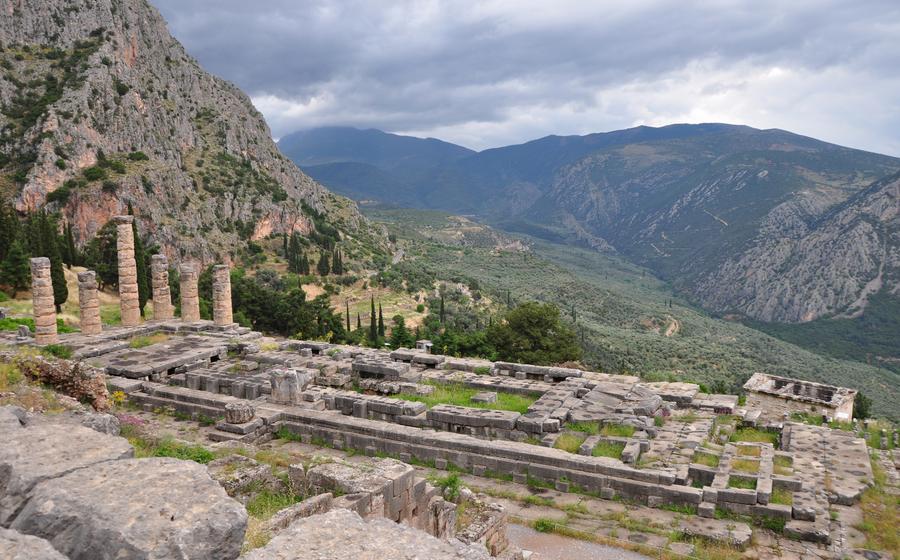
The Olive Press Museum of Amfissa
- A Trip to Delphi and the Olive Press Museum of Amfissa
- Olives in Greek Culture
- The Olive Press Museum of Amfissa: A Journey Through Time
- The Olive Press Museum's Exhibits
- A Taste of Olive Oil
- The Museum Shop
- Olive Groves Surrounding Amfissa
- Combining Your Visit with Other Attractions
- The Olive Press Museum: A Hidden Gem
- Delphi: A UNESCO World Heritage Site
- Getting to Amfissa and Delphi
- Where to Stay in Amfissa and Delphi
- What to Eat in Amfissa and Delphi
- Insider Tip: Olive Oil Festivals
A Trip to Delphi and the Olive Press Museum of Amfissa
The Olive Press Museum of Amfissa is a unique and fascinating destination that offers visitors the chance to delve into the rich history and culture of olive oil production in Greece. Located in the picturesque town of Amfissa, just a short drive from the ancient ruins of Delphi, the museum offers a comprehensive insight into the significance of olives in Greek history and their deep cultural roots.
The Olive Press Museum of Amfissa was established in 1993 and has since become a renowned center for olive oil education and appreciation. Set in a beautifully restored 19th-century olive press factory, the museum houses an extensive collection of antique olive presses, olive oil production tools, and artifacts related to olive cultivation. Visitors can learn about the traditional methods of olive pressing, as well as modern olive oil production techniques, and can even try their hand at pressing olives themselves.
A visit to the Olive Press Museum of Amfissa is a great way to learn about the history, culture, and gastronomy of Greece. The museum is a must-visit for anyone interested in olive oil, Greek cuisine, or cultural heritage.
Olives in Greek Culture
Olives hold a prominent place in Greek culture, deeply intertwined with the country's history, cuisine, and traditions. The cultivation of olives has thrived in Greece for millennia, dating back to the Minoan civilization on the island of Crete. Olive trees, with their silvery-green leaves and gnarled trunks, are an iconic symbol of the Greek landscape, covering vast swaths of land and contributing to the country's rich agricultural heritage.
In Greek mythology, the olive tree is associated with the goddess Athena, who is said to have gifted the first olive tree to the city of Athens. The olive branch, a symbol of peace and prosperity, was revered in ancient Greece and was often used in religious ceremonies and diplomatic negotiations.
Olives are not just a symbol of Greece's past but also a vital part of its present-day economy and cuisine. Olive oil, extracted from the fruit of the olive tree, is a staple ingredient in Greek cooking, adding a distinct flavor and aroma to a wide range of dishes. From traditional Greek salads to hearty stews and grilled meats, olive oil is an indispensable part of the Greek culinary experience.
The cultivation of olives and the production of olive oil are deeply ingrained in the lives of many Greeks, particularly in rural areas. Olive groves, with their rows of neatly pruned trees, are a common sight in the Greek countryside, and the olive harvest is an important annual event for many families.
The Olive Press Museum of Amfissa: A Journey Through Time
The Olive Press Museum of Amfissa offers a comprehensive overview of the history, traditions, and techniques of olive oil production in Greece. Visitors can explore the museum's exhibits to learn about the evolution of olive pressing methods, from ancient hand-operated presses to modern, automated machinery. Traditional olive pressing methods are demonstrated using replica presses, providing visitors with a hands-on experience of the physical labor and skill involved in producing olive oil. In contrast, modern olive pressing techniques are showcased through interactive displays and videos, highlighting the technological advancements that have revolutionized olive oil production in recent decades.
The museum also features interactive exhibits that allow visitors to engage with the olive oil-making process. Visitors can try their hand at grinding olives using a traditional millstone, extract oil using a replica press, and even taste different varieties of olive oil to learn about their unique flavors and aromas. These interactive experiences provide a deeper understanding of the production process and the factors that influence the quality of olive oil.
The Olive Press Museum's Exhibits
The Olive Press Museum of Amfissa houses an impressive collection of exhibits that showcase the rich history and cultural significance of olives in Greece. Visitors can marvel at antique olive presses, ranging from simple hand-operated devices to more complex mechanical presses. These presses represent the evolution of olive oil production techniques over the centuries.
The museum also displays a variety of olive oil production tools, including mortars and pestles, grinding stones, and oil lamps. These artifacts provide insight into the traditional methods used to extract olive oil from olives. In addition, the museum features a collection of photos and documents related to olive cultivation and olive oil production in Greece. These visual and written records offer a glimpse into the history and significance of this industry in the country.
Finally, the museum showcases traditional Greek costumes and artifacts associated with olive cultivation and olive oil production. These items, such as woven baskets, clay jars, and embroidered aprons, provide a glimpse into the cultural context of olive oil in Greece and its importance in everyday life.
A Taste of Olive Oil
At the Olive Press Museum, visitors have the unique opportunity to taste different types of olive oil and learn how to distinguish their flavors. Guided olive oil tastings are conducted by experts who provide insights into the production process, the different varieties of olives, and the factors that affect the taste and quality of olive oil. Visitors can sample a range of oils, from delicate and fruity to robust and peppery, each with its own distinct characteristics.
The museum also offers tips on how to taste olive oil properly and how to identify high-quality oil. Visitors are encouraged to swirl the oil in their mouths, paying attention to its texture, bitterness, pungency, and fruity notes. They are also taught how to pair different types of olive oil with different foods to enhance the flavor of their meals.
By experiencing an olive oil tasting at the museum, visitors gain a deeper appreciation for the complexity and diversity of this liquid gold and learn how to select and use olive oil to create delicious and healthy dishes.
The Museum Shop
The Olive Press Museum of Amfissa has a well-stocked shop where visitors can purchase a variety of products related to olives and olive oil. These include:
-
Olive oil: Visitors can choose from a selection of high-quality olive oils produced by local farmers and cooperatives. The shop also sells infused olive oils with various flavors, such as lemon, garlic, and herbs.
-
Local products: In addition to olive oil, the shop sells other local products, such as honey, cheese, wine, and traditional sweets. These products are all made with fresh, locally sourced ingredients and are a great way to support the local economy.
-
Souvenirs: The shop also offers a variety of souvenirs related to olives and olive oil, such as t-shirts, hats, mugs, and postcards. These souvenirs are a great way to remember your visit to the museum and to share your love of olives and olive oil with friends and family.
-
Books and publications: For those who are interested in learning more about olive cultivation and olive oil production, the shop sells a selection of books and publications on these topics. These books are written by experts in the field and provide a wealth of information on the history, culture, and science of olives and olive oil.
-
Information on local olive oil producers: The shop also provides information on local olive oil producers, including their contact details and the types of olive oil they produce. This information is helpful for visitors who want to purchase olive oil directly from the producers or who want to learn more about the olive oil-making process.
Olive Groves Surrounding Amfissa
The region surrounding Amfissa is renowned for its picturesque olive groves, which stretch across the rolling hillsides, creating a breathtaking landscape. The olive trees, with their gnarled trunks and silvery-green leaves, stand as silent witnesses to the region's rich agricultural heritage. During the olive picking season, which typically runs from October to December, the groves come alive with activity as locals and visitors alike participate in the harvest. The air is filled with the sound of laughter, chatter, and the gentle rustling of leaves as people work together to gather the precious olives.
Olive festivals are also a highlight of the region, celebrating the importance of olive cultivation in local culture. These festivals, often held in November or December, feature traditional music and dance performances, olive oil tasting competitions, and exhibitions showcasing the local olive oil producers. Visitors can learn about the different varieties of olives grown in the region, sample a wide range of olive oils, and even participate in olive picking activities.
Combining Your Visit with Other Attractions
In addition to the Olive Press Museum, Amfissa and Delphi offer a wealth of other attractions for visitors to explore. History enthusiasts can delve into the region's rich past at the Delphi Archaeological Museum, home to a vast collection of artifacts from the ancient city of Delphi. Nature lovers can embark on scenic hiking trails through the picturesque olive groves or explore the stunning landscapes of Mount Parnassus, the legendary home of the Muses. For those seeking a taste of traditional Greek culture, the nearby villages and towns offer a glimpse into the region's vibrant heritage, with charming streets, traditional tavernas, and local crafts. Wine enthusiasts can also enjoy visiting local wineries and vineyards, sampling the region's renowned wines amidst breathtaking scenery.
The Olive Press Museum: A Hidden Gem
The Olive Press Museum of Amfissa is an underappreciated treasure that offers a unique and immersive experience into the rich history and culture of olive oil production in Greece. It is a must-visit destination for anyone interested in gastronomy, cultural heritage, and authentic travel experiences.
The museum takes visitors on a journey through time, showcasing traditional and modern olive pressing methods and providing an in-depth look at the significance of olives in Greek culture. Through interactive exhibits, antique olive presses, and a variety of artifacts, visitors gain a deep appreciation for the role of olives in shaping Greek history, cuisine, and traditions.
The Olive Press Museum is more than just a museum; it is a celebration of the olive tree and its profound impact on Greek culture. It is a place where visitors can discover the secrets of olive oil production, taste different varieties of olive oil, and learn about the importance of this liquid gold in Greek gastronomy and everyday life.
For those seeking an authentic and off-the-beaten-path experience, the Olive Press Museum of Amfissa is an absolute gem. It is a place where visitors can immerse themselves in the world of olives, gain a deeper understanding of Greek culture, and create lasting memories in the heart of the Greek countryside.
Delphi: A UNESCO World Heritage Site
Delphi, located near Amfissa, is an ancient city of great historical significance. It was considered the center of the world in ancient Greek mythology and was home to the famous Oracle of Delphi, where people from all over the world came to seek advice and guidance from the gods.
The ruins of Delphi, including the Temple of Apollo, the Treasury of Athens, and the Delphi Archaeological Museum, are a UNESCO World Heritage Site, attracting visitors from around the world. The museum houses a vast collection of artifacts from the ancient city, including sculptures, pottery, and inscriptions, providing a glimpse into the rich history and culture of Delphi.
Mount Parnassus, which rises above Delphi, offers stunning views of the surrounding landscapes, making it a popular destination for hiking and nature enthusiasts. The area is also home to several traditional Greek villages and towns, where visitors can experience the authentic charm and hospitality of the region.
Getting to Amfissa and Delphi
Amfissa and Delphi are easily accessible from Athens and other major cities in Greece. The most convenient way to get there is by car, which offers flexibility and allows you to explore the picturesque countryside at your own pace. From Athens, take the A1 motorway towards Lamia and exit at Bralos. Follow the signs to Amfissa, which is about a 2-hour drive from Athens.
If you prefer to use public transportation, there are regular buses from Athens to Amfissa and Delphi. The journey takes about 3 hours and tickets can be purchased at the bus station. From Amfissa, you can catch a local bus or taxi to Delphi, which is just a short distance away.
For those who want to explore the region more extensively, renting a car is a great option. Car rental agencies are available at Athens International Airport and in major cities throughout Greece. Driving in Greece is generally safe, but be prepared for narrow roads and winding mountain passes.
To plan your journey, consult online resources such as Google Maps or Waze for up-to-date directions and traffic conditions. Remember to factor in rest stops and allow ample time for exploring the region's many attractions.
Where to Stay in Amfissa and Delphi
Finding the perfect place to stay is crucial for a comfortable and enjoyable experience in Amfissa and Delphi. Whether you prefer modern hotels, charming guesthouses, or traditional Greek guesthouses, you'll find a range of accommodation options to suit your needs and budget.
In Amfissa, the Hotel Amfissa offers modern and comfortable rooms, while the Guesthouse To Palio Archontiko provides a more traditional Greek experience. For a luxurious stay, the Amfissa Palace Hotel is an excellent choice.
In Delphi, the Hotel Orfeas offers stunning views of the valley and the ancient ruins, while the Delphi Hotel is known for its friendly service and cozy atmosphere. For a more affordable option, the Delphi City Hotel provides clean and comfortable rooms.
To find the best deals and discounts, consider booking your accommodation in advance, especially during the peak tourist season. Online booking platforms and travel agencies often offer special promotions and discounts.
Insider Tip: If you're looking for a truly authentic experience, consider staying in a traditional Greek guesthouse. These guesthouses often offer a glimpse into Greek culture and hospitality, with warm and welcoming hosts who are eager to share their local knowledge and traditions.
What to Eat in Amfissa and Delphi
The cuisine of Amfissa and Delphi is rich in traditional Greek dishes, many of which feature the region's renowned olive oil. Must-try local specialties include gemista (stuffed tomatoes and peppers), mousakas (eggplant and potato casserole), and souvlaki (grilled meat skewers). For a taste of local seafood, try the freshly caught fish from the Gulf of Corinth, grilled or fried to perfection.
In Amfissa, be sure to sample the town's signature dish, "sfougato", a delicious filo pastry pie filled with cheese, herbs, and vegetables. Don't miss the opportunity to try "talagani", a local semi-hard cheese with a unique flavor, often served grilled or fried.
For a truly memorable dining experience, head to one of the many traditional tavernas in the region. These family-run establishments offer a warm and welcoming atmosphere, along with authentic Greek cuisine prepared using fresh, local ingredients. Be sure to ask your server for recommendations on the day's specials and don't forget to order a glass of the local wine to accompany your meal.
Whether you're a foodie looking to sample the region's culinary delights or simply seeking a delicious and authentic Greek dining experience, Amfissa and Delphi have something to offer every palate.
Insider Tip: Olive Oil Festivals
Olive oil festivals are a great way to immerse yourself in the local culture and celebrate the region's olive oil production. These festivals usually take place in the fall, during the olive harvest season. Visitors can witness traditional olive picking methods, participate in olive pressing demonstrations, and taste a variety of freshly pressed olive oils. There are also cultural events, live music, and traditional Greek dancing.
Some of the most popular olive oil festivals in the region include the Amfissa Olive Oil Festival, the Delphi Olive Oil Festival, and the Galaxidi Olive Oil Festival. These festivals attract thousands of visitors each year and offer a unique opportunity to learn about Greek olive culture and traditions.
If you're visiting Amfissa or Delphi during the olive harvest season, be sure to check out one of the local olive oil festivals. It's a great way to experience the region's rich olive oil heritage and enjoy the delicious flavors of freshly pressed olive oil.
